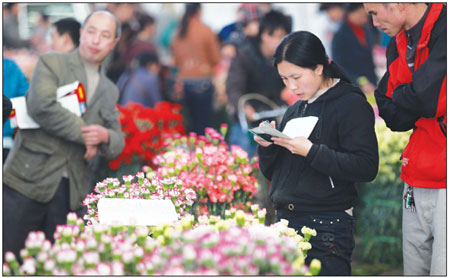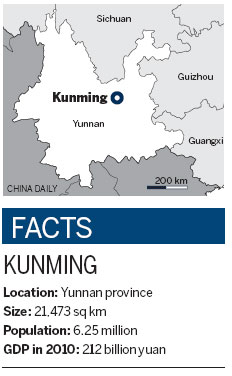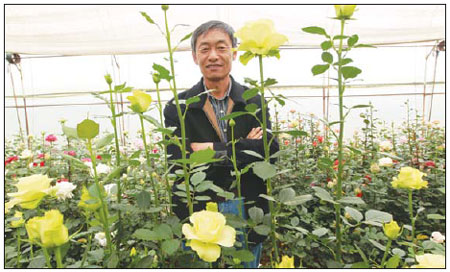Economy
Flower power
Updated: 2011-05-20 12:03
By Li Yingqing and Yang Yang (China Daily European Weekly)
Chinese floriculture hub aims for the global market
|
 Dealers at the Kunming Dounan Flower Market, the largest of its kind in Asia. Photos by Cui Meng / China Daily |
Cool and sporadic April rain falls on Kunming at two in the morning. Most residents in the capital of Southwest China's Yunnan province are fast asleep at this time ?except for the road leading up to the city's Dounan Flower Market, the largest of its kind in Asia, in Chenggong county about an hour's drive away. Kong Weihu, 23, is one of the countless motorists waiting in cars, vans and other vehicles on the congested road. "There's always a traffic jam here at this time,?he
|
 |
Each morning, Kong drives thousands of freshly cut flowers from his 6.6 hectares of hothouses 50 kilometers away from the market. On this trip, he has more than 20,000 carnations in the van. Dealers will buy his flowers and transport them to various Chinese cities as well as to Japan and South Korea. If the price is good, Kong may rake in more than 20,000 yuan (2,170 euros) in sales.
Kong is just one of the thousands of people trading flowers daily in the market. Every morning, the millions of the flowers sent from the market through Kunming account for 80 percent of the flowers sold in more than 70 Chinese cities, figures from the Yunnan provincial agricultural department show.
In 2010 alone, 4.7 billion fresh flowers were traded here, with the total transaction value reaching 3.4 billion yuan, says Huo Ran, deputy general manager of China Kunming Dounan Flower Industrial Park Development Co Ltd, which owns the Dounan Flower Market. Eighty-five percent of China's new flower varieties will also be "tested" in market, Huo says.
More than 40 countries and regions including Japan, Dubai and Thailand receive flowers from this market, Huo says.

Yang Yuyong, president of Kunming Yang Chinese Rose Gardening Co Ltd. Photos by Cui Meng / China Daily |
Many consider Dounan market to be a bellwether of the booming flower industry in Yunnan. During the 11th Five-Year Plan period (2006-2010), the area for growing the flowers in Yunnan province grew to 42,000 hectares in 2010 from 16,000 hectares in 2005, statistics from the provincial agricultural department show.
The province's flower yield grew to 6.05 billion from 3.6 billion, leading China's flower industry in 17 consecutive years. The total annual income of the growers in Yunnan rose from less than 2 billion yuan in 2005 to 6 billion yuan in 2010, while their total output value rose from 5 billion yuan to 232 billion yuan, according to the department. Last year, the export sales of Yunnan's flower industry tripled to $150 million (104.9 million euros) from $50 million in 2005.
While the province boasts the country's largest flower yield and leads the domestic market, it still faces difficulties in entering the international market especially in Europe, which mirrors the export situation of China's flower industry.
"Although China's flower yield accounts for 40 percent of the world's total, our export share in the international market is merely 2 percent," Huo says.
Yunnan's flowers are exported to neighboring countries and regions but they seldom reach Western Europe and North America, the two major consuming regions for fresh flowers.
"The biggest problem for exporting flowers from Yunnan is logistics," says He Kui, deputy director of Yunnan's flower industry office.
About 95 percent of Yunnan's floriculture products are transported by air, Huo says.
"Transportation of fresh flowers via air hampers our exploration into the European market for two reasons. One is that the transport costs are so high that there are no decent profits left for growers or dealers," He says.
Leading rose producer Kunming Yang Chinese Rose Gardening Co Ltd used to export flowers to Australia and Europe, but after the financial crisis its export destinations decreased to only Japan and South Korea.
"One of the most important reasons for the change is that transport costs are climbing so high with soaring energy prices," says Yang Yuyong, president of the company.
The proportion of the company's sales made out of exports has declined from 60 to 70 percent before the financial crisis to last year's 10 percent.
Kunming Hongri Flower Plant Co Ltd, another flower company in the province, exports lilies, carnations, roses, African daisies and chrysanthemums to Japan, South Korea, Thailand and Dubai. All its products are transported by air.
"If the export sales are $400,000, half will go to logistics," says Zhao Lu, the export manager of the company.
He Kui also points to irregular flights affecting Yunnan's flower exports. Fresh cut flowers headed for Europe have to be transferred from Bangkok since Kunming's airport has no direct flights.
"Instead of special cargo planes, we usually transport fresh cut flowers on airliners. The flower quality cannot be guaranteed since the differences between ground and air temperature are big," says He, adding that "sometimes there is no space on the airliners, so the flowers have to wait in Bangkok. As a result, customers cannot receive high-quality flowers on time".
But in February last year, a direct flight from Kunming to Dubai was opened. As part of the country's 12th Five-Year Plan (2011-2015), a new international airport will also provide better transportation options for fresh flowers.
Compared with the Netherlands, the largest flower exporter, Yunnan's flower industry also falls behind in new high-quality species, flower preservation techniques and packing.
"Without these advantages, the flowers cannot maintain high quality and freshness before reaching their destinations and cannot sell at good prices in overseas markets," He says.
In recent years, local companies have tried to close the gap by cooperating with the Yunnan Academy of Agriculture Sciences in the research and development (R&D) of new flower varieties and preservation techniques.
By the end of 2010, Yunnan had bred 145 new flower varieties, 80 percent of the country's total. Among them, 54 had been granted with plant variety protection right and three had gained the recognition of the international market, according to a recent report of the Yunnan flower industry office.
In his 20-hectare planting base, two-hour's drive from downtown Kunming, Yang Yuyong proudly introduces his breeding of improved rose varieties.
"There are more than 500 fine varieties of roses collected from all around the world being grown here and our job is to develop better ones by making hybrids from existing kinds," Yang says.
Some fine varieties in the area include the popular "Princess of Monaco", "Iceberg Rose" and "Avalanche" from Germany and France. Other precious varieties such as "Moon Reflection on Lake" can be traced to China's Ming (1368-1644) and Qing (1644-1911) dynasties. Yang traveled around the country to look for the varieties recorded during the Qing Dynasty. The province's rich biodiversity and geography also provide a source of wild flowers.
"Like what the Dutch did to tulips, which originated in China, I think we should make good use of the rare, beautiful natural resources in Yunnan and develop the wild flower varieties into commercial ones," Yang says.
Yang also introduced tropical plants such as protea from South Africa into his testing fields. A protea flower sells for 5 euros at wholesale prices in Europe and 120 yuan in Hangzhou, capital of East China's Zhejiang province.
"Because the price is so high, we can make a good profit by exporting protea to Europe even with the high logistics costs," Yang says. He plans to export protea to Europe in the near future.
As for preservation of fresh cut flowers, Yunnan Jinyuan Flower Industry Co Ltd has developed a cold-chain technique that will keep flowers fresh in cool surroundings from the time they are picked from the field until they are sold in the markets. The technique is expected to prolong the flowers' vase life but more importantly, it allows more time for the products to be transported.
But more needs to be done for the local producers to compete globally.
"The biggest challenge for Yunnan flowers entering the European market in the future will possibly be technical barriers to trade in terms of environmental protection," He Kui says.
In the late 1990s, growing flowers was also blamed for polluting Dianchi Lake, 7.8 km from Dounan Flower Market. As a result, the government in 2008 banned farming flowers within 3 km around the lake, although the Food and Agriculture Organization of the United Nations concluded that the root of the pollution was sewage from Kunming.
Environmental protection now involves the whole flower growing process from breeding, growing and packing to transporting, preserving and disposing waste.
"First, we should select fine varieties of flowers that are highly resistant to diseases, pests and low temperature to decrease the use of pesticides and carbon emissions from heating systems," says Wang Jishi, director of the Institute of Flowers at the Yunnan Academy of Agricultural Sciences.
As for production and trading, many say Yunnan can borrow from the experience of the Netherlands. In the 1950s, residents around the Flower Auction Aalsmeer center sued it for worsening the surroundings due to the large amount of waste and preservatives dumped from the flower industry. The center subsequently sent experts to investigate the negative effects of flower production on the environment.
The investigation was extended to many fields, including the consumption of energy, the use of fertilizers and pesticides, and the recycling of waste during the production and trading of flowers. A series of standards to plug the problem were gradually established.
In 1996, the Dutch floriculture sector also initiated the MPS certification system to promote the sustainable cultivation of flowers and plants. The MPS has become a leading international organization that certifies that businesses in the sector operate in accordance with the principles of sustainability. The system verifies that the holder uses a minimum amount of energy, fertilizers and pesticides and generates minimum waste.
Three years ago, China's General Administration of Quality Supervision, Inspection and Quarantine worked with the Dutch authorities to invite 80 Chinese flower companies to grow flowers and plants according to MPS standards.
The participants were asked to record the flower production areas and the amount of electricity, water, fertilizer and pesticides used in the flower fields each month. A year later, the Dutch carried out the relevant assessments. Two Yunnan companies reached the "One A" level out of the highest "Three A" level.
Kunming Yang Chinese Rose Gardening Co Ltd is one of the two companies to have attained the level, and the other is a company invested by the Dutch. More than 10 companies in Yunnan earned the MPS certification in 2009 and the province now boasts the most number of companies in the country with the standard.
Pollution control has also become another important part of environmental measures in the sector.
"We are researching the preservation of fresh flowers for ground transportation since carbon emissions of air transport is much higher than on ground," the academy's Wang Jishi says.
As a leading flower producer in Yunnan, Kunming Yang Chinese Rose Gardening Co Ltd has also set its eyes on the growing methods in the Netherlands, the US and Israel, where flowers grow in open fields instead of hothouses, equipped with modern irrigation systems.
"Europeans have published books about plant nutrition analysis, which provides growers with the minimum amount of fertilizers for each plant variety," says Yang Yuyong. He plans to find 500-mu (33-hectare) of land to grow landscape plants in the open air, just like the lavender fields in France's Provence and the tulip fields in the Netherlands.
"Imagine the flower carpet extending on the whole hillside. It must be wonderful," Yang says. "We first need to select proper varieties that are suited the open environment so that we no longer need hothouses and heating systems. With a minimum amount of fertilizers and pesticides, we will also minimize harm to the environment and actually beautify it."
Yang also plans to build a flower industry park, making full use of its rich rose resources to attract visitors and increase the added value of flowers.
"Building industry parks is a trend for the development of Yunnan flower industry," He Kui says. "It will help truly modernize our flower production."
Specials

Suzhou: Heaven on Earth
Time-tested adages sing praises of Suzhou, and Michael Paul Franklin finds it's not hard to understand why on a recent visit.

The sky's the limit
Chinese airline companies are increasingly recruiting pilots and flight attendants as the industry experiences rapid expansion.

Diving into history
China's richest cultural heritage may lie in the deep, like exhibits in a giant underwater museum.